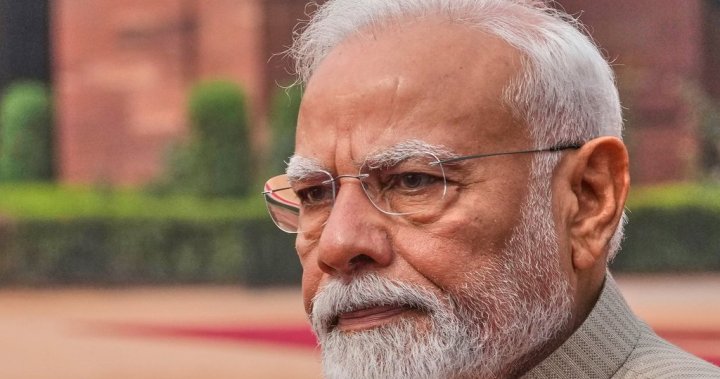The NDP is calling on Prime Minister Mark Carney to rescind Narendra Modi’s invitation to the G7 Summit after Global News revealed a suspected agent of the Indian government surveilled their former leader.
Global reported Thursday that Jagmeet Singh was under surveillance by an agent suspected of working for the Indian government, which resulted in the former NDP leader being placed under RCMP protection in late 2023.
Multiple sources said the agent, also suspected of ties to the Lawrence Bishnoi gang, had detailed information on Singh’s family, travel patterns and daily routine. The Bishnoi group is a transnational syndicate led by Lawrence Bishnoi, who is currently in an Indian jail, which has been linked to multiple murders, extortion and drug-related crimes.
“The targeting of a federal party leader by a foreign regime is a direct assault on Canada’s democracy. It is utterly unconscionable that the prime minister would extend an invitation to Modi under these circumstances and in light of this new information,” NDP MP Jenny Kwan said in a statement.
“This is no longer just about diplomacy — it is about the safety and sovereignty of Canadians.”
According to Global’s sources, police notified Singh of a credible threat to his life in late 2023 and placed both him and his homes under close protection. Singh, who lost his seat in the recent federal election and resigned as party leader, is no longer considered to be in imminent danger.
Singh told reporters in April the RMCP warned him in late 2023 that his life was in danger, but did not reveal further details of the threat.
Get daily National news
Get the day’s top news, political, economic, and current affairs headlines, delivered to your inbox once a day.
Global News sent a detailed list of questions to Carney’s office Thursday morning, including whether the prime minister was aware of the surveillance of Singh when he extended an invitation to Modi to attend the G7 and whether the Canadian government has raised the issue with India.
The Prime Minister’s Office (PMO) did not directly respond to those questions. Instead, they sent a written statement indicating that “any form of attempted foreign interference is unacceptable.”
“The G7 summit will focus on the most pressing global challenges and opportunities facing us today … As prime minister of the fifth largest economy and the world’s most populous country, Prime Minister Modi was invited to participate in some of these critical discussions,” wrote Audrey Champoux, a spokesperson for the PMO.
“Importantly, Prime Minister Carney and Prime Minister Modi agreed to continued law enforcement dialogue and discussions to address serious security concerns.”
India was named as the second-most active country involved in foreign interference operations in Canada, behind only the People’s Republic of China, in Justice Marie-Josée Hogue’s federal inquiry.
Most of the conversation around foreign interference in Canada to date has centred around nomination or leadership contests, backroom politics and clandestine influence and cash.
Revelations a foreign government allegedly spied on the movements of the leader of a Canadian political party — who police warned his life was in danger — is a different story, according to former NDP strategist Jordan Leichnitz.
“It’s shocking by any reasonable standards. This is not the type of thing that anybody would be expected to be concerned about in the political sphere in Canada,” Leichnitz said in an interview.
“And it certainly brings into sharp focus another aspect of the foreign interference conversation that I think sometimes gets a little bit lost, which is the way that Canadians who may be members of diaspora communities can be targeted for harassment or even violence in these situations.”
Relations between the two countries have long been tense over India’s perception that Canada is too lax when it comes to the Khalistan movement, which seeks independence for India’s Sikh-majority Punjab region. The Indian High Commission did not respond to Global News’ earlier request for comment.
The diplomatic relationship further soured in 2023, when former prime minister Justin Trudeau publicly said Canada had intelligence linking the murder of Hardeep Singh Nijjar in Surrey, B.C., to agents working for the Indian government.
New Delhi still refuses to co-operate with an RCMP investigation into the killing of Nijjar, a Sikh temple leader and pro-Khalistan activist, despite Carney’s “continued law enforcement dialogue” with Modi.
At a press conference in Ottawa Thursday morning, the World Sikh Organization of Canada (WSO) condemned the alleged targeting of Singh, saying it follows a “series of deeply troubling disclosures” of Indian clandestine operations in Canada.
“Let that sink in. India targeted a Canadian politician on Canadian soil. That’s absolutely unprecedented. As far as we’re concerned, that’s an act of war,” said Balpreet Singh with the WSO.
“The government has to reconsider Mr. Modi’s invitation (to the G7 meetings) and demand full accountability from India. This is not just about Sikh activists. It’s about Canada’s sovereignty, its democracy, and its commitment to human rights.”
— With files from Stewart Bell and Mercedes Stephenson.
© 2025 Global News, a division of Corus Entertainment Inc.

